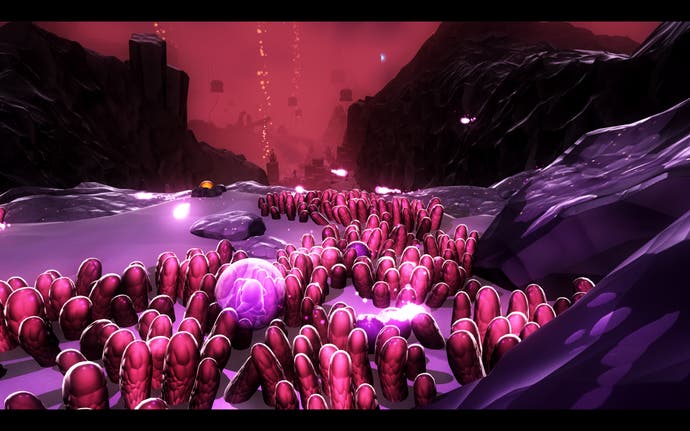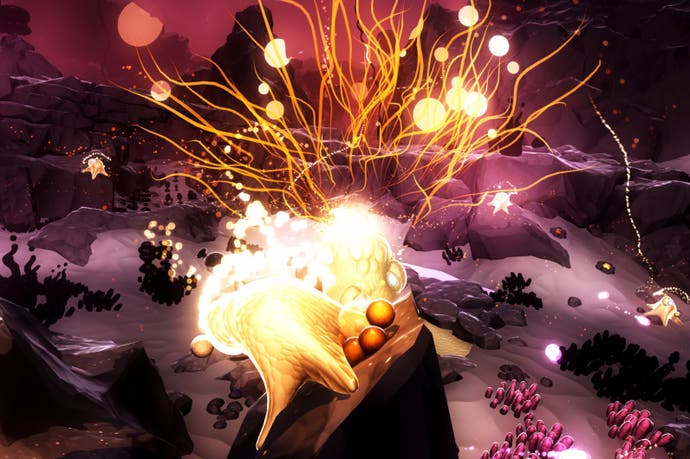Ode review
The notes of Ranvier.
Ode is a musical exploration game, which is a bit like saying ET is a movie about missing your flight. Ode is music and exploration. Somehow, they are separate and yet entirely intertwined.
You play as a chubby little sprite of some kind, snugly encased in a crystal marble. You spawn in a burst of bloomy white light in what looks like a frozen cave, chill grey sand covering the floor, bright little chunks of rock - volcanic maybe, glossy and black and shot through with glitter - poking through here and there. As you roll around, the audio seems to shift and sigh, almost imperceptibly. You bounce off rocks - because why not? - and you are rewarded, if you listen closely, with flat little taps of a drum. You are rewarded if you listen closely, sure, but maybe the real reward comes from not listening closely, because if you just move, prodding forward, now a rock, now a rippled stretch of sand, you will not notice the music that is slowly building itself around you, and then you will suddenly discover that you are humming it, almost like it came from you and not from the game.
Soon there are spongey discs to roll over, bright balloons bursting from them as you pass. Soon there are fronds hanging from the walls that release showers of pink blossom. There are fallen stars - little golden balls that have buried themselves in the ground - to gather as you nudge them. They form threading pathways through the game's tight, but sometimes complex, spaces, like Mario's coins. And as you collect them, they trail behind you, bouncing, or can be flung into the distance, where they rattle around, a cheery, physics-driven motley, before you draw them back in again.
Everything has a sound that fits its strange appearance. Everything tinkles or groans or beeps or skitters. And then you find yourself in a larger cave, with a huge green mass in the center, an organic lump emerging from the ground. Scattered around you are smaller green lumps, and if you hit each one with one of your trailing stars - flinging it, getting it on the rebound, or even just trundling over it - that green lump will turn to gold. Once they are all gold, the central mass ignites and the music you have been making starts to truly cohere. The path ahead becomes clear and the whole thing repeats, with variations, until the end.
Are you bringing the world back to life? Maybe. You're certainly bringing it into voice. Each of Ode's four levels has a distinct look and a distinct setting - toxic islands, a disco mountain - and they are all filled with their own plants and creeping things, a taxonomy of characterful sound toys. Wonderfully, while all of this is delightful, Ode is not remotely cute or twee. Its worlds are deeply alien spaces that suggest the sorts of internal things we do not like to dwell upon very often. They are weird and organic and, frankly, neuronal, built from the crackle of glossy axons and dendrites, the atomiser puffs of synapses. Or they are intestinal: valleys of pink villi that bounce and jitter with sound as if affronted by your presence. There are fatty nodes. There are trumpet organs. There are kettle drum tumours.
And that central process of igniting the green lumps one at a time offers just enough direction for a game that doesn't want to punish you and doesn't even mind if you don't follow it clues from one area to the next. In fact, the ideal Ode player probably doesn't race to the finish line at all, but rather dawdles. It is so easy to dawdle when you are a marble, after all, driven by curiosity and by the warp and divots of the floor beneath you. Those stars you collect - one big marble trailed by hundreds of others - can be chucked around whenever you please, and they also tie into a riffy little system of power-ups, not that I want to diminish them by calling them that. Think of them as quick-changes. You'll drop into a colourful pool and suddenly the stars you're carrying allow you to bounce higher, or to race around like a chuggy little wheel, or to... better not spoil that one, actually.

They're not power-ups or quick-changes, really. Think of them as middle-eights, those secret best parts of every song where, if the band is feeling fancy, something will come along to break up the established structure, to invert it and escalate it and leave it on a crazy high. It can be hard to work out where the music ends here. It can be hard to tell what is exploration and what is music by the end of it, once you're high up on that disco mountain, flinging hundreds of stars into the distance, watching them bounce and chime and shimmy before drawing them back towards you in triumph.
Ode is the work of Ubisoft Reflections once again, the work of the tiny team that brought us treats like Grow Home and Atomega. Over time, a theme is emerging, I think. Alongside a delight in movement and colour and interesting shapes, alongside an interest in changing scale and in playful interactions, this team makes games that feel, in the very best way, like sketches. Have you ever doodled something, briskly and with strange purpose, on a restaurant napkin or while waiting on hold on the phone, and then sensed that the lines you've made have really pleased you, that the shapes they form has a weird kind of energy and alertness that you know would not translate to a more detailed version, if you busted out your best pens and your best paper? We tend to think of sketches as something throwaway, dashed off, something that is a means to a more detailed end. There is nothing throwaway or dashed off about games like Ode or Grow Home or Atomega, but they have that kind of unmistakable tension that sketches have, that kind of self-belief that understands that speed is the thing, that the bits and pieces will all end up in the right place if you take the idea exactly as it forms and follow it quickly to its conclusion.
That's it. A single idea explored with enthusiasm and wit and a sense of delight that passes directly to the player. Ode is magic.



